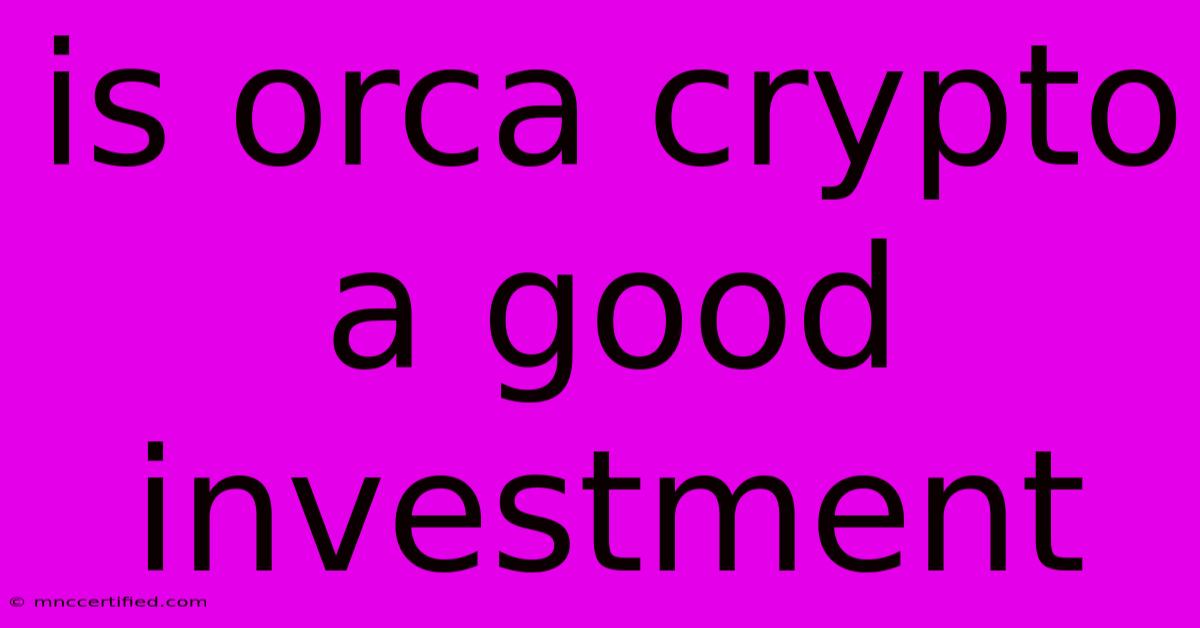Is Orca Crypto A Good Investment

Table of Contents
Is Orca Crypto a Good Investment? A Deep Dive into Solana's DEX
Orca is a decentralized exchange (DEX) built on the Solana blockchain, known for its speed and low transaction fees. But is it a good investment? The answer, as with any cryptocurrency, is nuanced and depends on your risk tolerance, investment timeline, and understanding of the DeFi space. This comprehensive guide will delve into the pros and cons of investing in Orca, helping you make an informed decision.
Understanding Orca and its Ecosystem
Orca distinguishes itself as a high-performance DEX optimized for Solana's capabilities. Unlike many other DEXs that rely on automated market makers (AMMs) with complex algorithms, Orca utilizes a concentrated liquidity model. This improves capital efficiency, resulting in tighter spreads and lower slippage for traders. This is a significant advantage, especially for larger trades.
Orca's ecosystem also boasts several key features contributing to its appeal:
- Fast Transaction Speeds: Leveraging Solana's speed, Orca offers significantly faster transaction times compared to Ethereum-based DEXs.
- Low Transaction Fees: Solana's low transaction costs translate directly to lower fees on Orca, making it a cost-effective platform for frequent trading.
- User-Friendly Interface: Orca boasts an intuitive and easy-to-navigate interface, even for users new to decentralized exchanges.
- Growing Ecosystem: Orca is actively integrating with other Solana-based projects and applications, expanding its utility and potential for growth.
The Case for Investing in Orca
Several factors suggest Orca could be a worthwhile addition to a diversified crypto portfolio:
- Solana's Growing Popularity: Solana's blockchain continues to gain traction, attracting developers and users alike. As Solana grows, so too does the potential for Orca's success. This makes Orca a potential beneficiary of the Solana network effect.
- High Liquidity: Orca maintains high liquidity across a range of trading pairs, reducing the risk of significant slippage and ensuring smooth transactions.
- Concentrated Liquidity Model: This model offers advantages over traditional AMMs, making Orca a more efficient and attractive option for traders.
- Potential for ORCA Token Appreciation: The ORCA token powers the Orca ecosystem and offers governance rights to holders. Increased adoption of the platform could lead to increased demand and value for the token.
The Risks of Investing in Orca
It's crucial to acknowledge the inherent risks associated with investing in Orca and cryptocurrencies in general:
- Volatility: The cryptocurrency market is notoriously volatile, and the price of the ORCA token can fluctuate dramatically. Be prepared for significant price swings.
- Smart Contract Risks: As with any decentralized application, there's a risk of vulnerabilities in Orca's smart contracts. While Orca has a strong reputation for security, exploits are always a possibility.
- Solana Network Risks: The performance and security of Orca are directly tied to the Solana blockchain. Any issues affecting Solana could negatively impact Orca.
- Regulatory Uncertainty: The regulatory landscape for cryptocurrencies is constantly evolving, and changes in regulations could significantly affect Orca's operations and value.
Is Orca Right for You?
Investing in Orca, or any cryptocurrency, requires careful consideration. Ask yourself these questions:
- What is your risk tolerance? Are you comfortable with the potential for significant losses?
- What is your investment timeline? Are you investing for the short term or long term?
- Do you understand the technology behind Orca and Solana? A thorough understanding of the technology is crucial for making informed investment decisions.
- Is your portfolio diversified? Investing in Orca shouldn't be your only crypto investment; diversification is key to managing risk.
Conclusion: A Promising but Risky Investment
Orca presents a compelling investment opportunity within the Solana ecosystem. Its speed, low fees, and user-friendly interface are strong advantages. However, the inherent volatility of the crypto market and the risks associated with decentralized applications must be carefully considered. Only invest what you can afford to lose and conduct thorough research before making any investment decisions. Remember to always diversify your portfolio to mitigate risk. The information provided here is for educational purposes only and should not be considered financial advice.

Thank you for visiting our website wich cover about Is Orca Crypto A Good Investment. We hope the information provided has been useful to you. Feel free to contact us if you have any questions or need further assistance. See you next time and dont miss to bookmark.
Featured Posts
-
Four Tourist Deaths In Laos Methanol Suspected
Nov 21, 2024
-
Casinos That Accept Vanilla Visa
Nov 21, 2024
-
Covalent Bonds Gizmos Answer Key
Nov 21, 2024
-
Legacy Insurance Services Claims
Nov 21, 2024
-
Mobile Home Insurance In Alabama
Nov 21, 2024